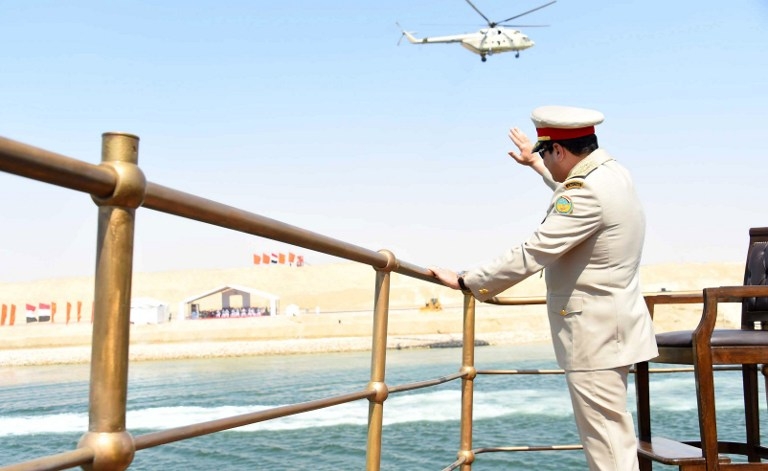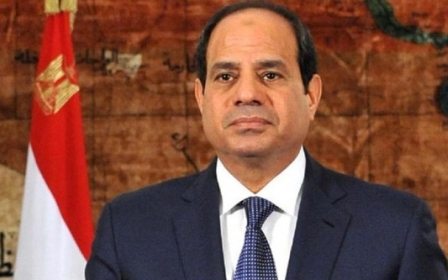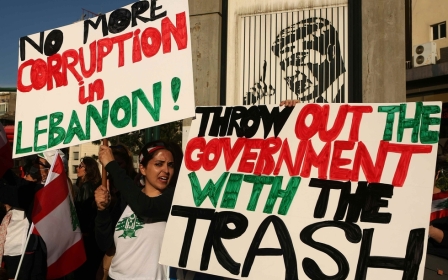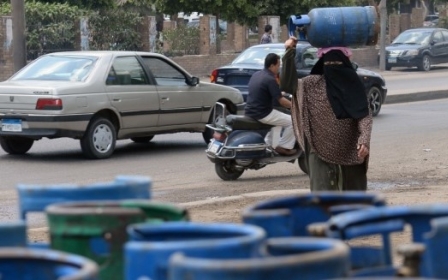Egypt's economic noose tightens around Sisi's neck

For more than three decades, Egyptian leaders have seen the roots of their downfall in their economic policies.
When President Anwar Sadat tried to cut state subsidies for basic goods in 1977, the nationwide protests of the "Bread Intifada" erupted. Four years later, Sadat’s open-door economic policy, coupled with his peace deal with Israel, resulted in his assassination.
His successor, Hosni Mubarak, was able to stay in power for nearly 30 years by implementing economic reforms conditioned by Western financial institutions, while also maintaining loyalty and support within state institutions and the public sector. He did this by continuing bread and energy subsidies amongst other compromises.
But in his last five years, his son, Gamal Mubarak, acting on his father’s behalf, launched a campaign of privatisation which was marred by corruption, inflation and the leveraging of corrupt businessmen in power, which helped spark an uprising that overthrew Mubarak in 2011.
After leading a coup against the democratically elected president Mohamed Morsi three years ago, Egypt's intelligence general–turned-president, Abdul Fatah al-Sisi, consolidated his grip on power by appeasing the counter-revolutionary forces, particularly the military, police and civil servants to guarantee his social base of support. Only the support of this deep state - the networks of power and influence that lie beneath the official government - has he been able to implement his repressive policies.
Unlike Mubarak and Morsi, Sisi has so far been able to consolidate his authoritarian rule despite his government’s failure to address Egypt’s economic challenges by jailing tens of thousands of political opponents. These policies have been reckless, given that the economic crisis was the main driver behind the 2011 uprising before it was hijacked by the Muslim Brotherhood and ended up in the hands of the military post-2013.
But Egypt’s worsening economic conditions have now put Sisi’s regime in a corner because he risks losing public sector support if he is unable to keep paying some six million civil servants, whose salaries account for 26 percent of government spending.
To ease the drainage of hard currency and restore confidence in the economy, Sisi’s government now is seeking a $12bn loan from the International Monetary Fund (IMF). If approved, the loan package would be the largest ever offered to a country in a region engulfed by political unrest and hard hit by plunging oil prices.
Plummeting reserves, falling pound
Egypt devalued the local currency by 13 percent in March in an attempt to bridge the gap between the official and parallel rates, commonly known as “the black market”, and analysts expect another devaluation to take effect by the end of the year. Yet, the devaluation neither boosted the dollar liquidity nor closed the gap.
State reserves have dropped rapidly from $36bn before the 2011 uprising to around $17.5bn this year, according to the Central Bank. This month, foreign currency reserves have been further drained as Egypt returned a $1bn deposit to Qatar and paid $720m in fees to the Paris Club group of creditors. The situation has been further aggregated by falling remittances from Egyptians living abroad who have been hesitant to transfer hard cash because of political and economic uncertainty.
Furthermore, the remarkable decrease of exports and foreign investments, coupled with a decline of tourism revenues, have all worked to raise the inflation rate to 14.6 percent in June 2016, compared to 12.3 percent in May and 10.3 percent in April, according to the state-run statistics agency.
The Egyptian pound plummeted against the US dollar reaching EGP 8.00 in official markets and EGP 13.00 in the parallel market. Thus, the Egyptian pound lost 60 percent of its value in the five years after the 2011 uprisng, despite the biggest-ever aid flow from the Gulf.
Sisi’s government views the IMF loan as an international recognition of his government and a reward for his brave policy related to cutting energy and oil subsidies, enacting a Civil Service Bill, a law aimed at reforming the administrative apparatus, let alone, soon-to-be Value Added Taxation (VAT) tax.
Yet the IMF loan alone won’t repair the battered economy as long as the root causes of the crisis are ignored. Rather, it will lead to further inflationary pressure and, in turn, uncontrollable price hikes for basic commodities. In the end, it will disproportionately affect an estimated 25 million Egyptians – or more than 27 percent of the population - who live below the poverty line.
Sisi's dependency on foreign creditors and the IMF proves that he is not the right person to lead a major country such as Egypt. Three years ago, Saudi Arabia, United Arab Emirates and Kuwait granted him $23bn in aid over 18 months after the military overthrew Morsi, according to statements by the Investment Minister Ashraf Salman.
Where did the billions go?
This amount is double to what Sisi is now requesting from the IMF, but three years on, Egypt’s financial situation has only worsened, raising eyebrows about the government’s transparency and its ability to control spending if it were granted this aid package. Where, one wonders, did the $23bn go?
Another move that proved Sisi’s failure is the Suez Canal extension project. At the inauguration, he showed off, portraying himself as Gamal Abdul Nasser, a godfather of mega state projects, and promised Egyptians unrealistic revenues from his $8.2bn project which he insisted would be completed in a year rather than three. The hasty decision to complete the project raised the budget ceiling and added an unnecessary burden on the government.
Not only did Sisi squander needless money to feed his ego as a Nasser-reminiscent leader, but he also asked Egyptians to contribute to the project by interest-bearing investment certificates which millions found profitable as the government promised an interest rate of 12 percent. In the beginning, Sisi’s government claimed the project would more than double Egypt’s revenues to reach $13.2bn in 2023. However, declining oil prices and sluggish world trade movement led receipts to register $5.2bn in 2015, the inaugural year, compared to $5.5 bn in the previous year before the project.
To that end, the main factor behind the economic crisis is Sisi’s bad governance, his corruption-sponsoring policies and narrow-minded approach towards addressing political and security issues.
Shoot the messenger
To appease the IMF and other international donors, Sisi is keen to restructure the state’s administrative apparatus. The Egyptian parliament recently passed a controversial bill known as the “Civil Service Bill” aimed at reducing the state administration’s financial burden by increasing opportunities for early retirement and resignations, and restricting leaves of absence. Yet while reform is needed, Sisi is not only ignoring, but also protecting the systematic corruption running for decades in this sector. Without eliminating its roots, any type of reform is impossible.
This was clear when, in an unconstitutional move, Sisi dismissed the country’s top auditor, Hisham Genina, in March after he blew the whistle on corruption among officials in nerve-hitting statements to local media. Genina alleged that Egypt had lost “at least” EGP 600 billion (about $76bn) between 2012 and 2015 as a result of government corruption, especially corrupt state land deals.
Instead of taking Genina’s report into consideration and addressing the corruption issue, Sisi has sponsored a campaign against Genina which has seen his family defamed and, most recently, his sentencing to one year in jail over a charge of “disseminating false news that was harmful to state institutions and threatened public peace”. This unprecedented dismissal from a president to a state auditor shows which camp Sisi represents.
Applying the Civil Service law in the name of reforming the state administrative apparatus contradicts Sisi’s regressive approach toward state corruption. These double standards harm Egypt’s overall economy in a way that the IMF loan alone will never repair, given that less conditional and even bigger loans from the Gulf three years ago saw no change. Even worse, the law would trigger an unstoppable wave of anger and opposition from a sector that has thrown their support behind Sisi until now.
No easy options
Sisi’s options to solidify his grip on power are limited. He could adopt the traditional way of maintaining the current situation as it is and serving the economic interests of the military, police and civil servants. In this case, he will have support from the administrative sector and security apparatus which might prolong his regime's life, but in the long term, it will lead to a larger social and economic decay that will backfire on his viability.
The other scenario is to show loyalty to the IMF and abide by its conditions which requires reforming the state bureaucracy, cutting government spending, slashing subsidies, imposing larger taxation, coupled with taking strict austerity measures. While this might realistically help the economy in the long term, it will come at the expense of losing a vital base support base in the public sector. Furthermore, it will widen the gap between the rich and the poor to dangerous levels, leading to a revolt against his regime. Either way, the regime would face obstacles to maintaining his authoritarian rule.
To avert the fate of his predecessors, Sisi urgently needs to implement economic reforms that serve the interest of the grassroots rather than interest-groups and international donors, namely combating corruption. To guarantee that reform - which will require austerity measures and reforming state bureaucracy - won’t bring a backlash against his government, he needs to build a social base of support to take the steam out of potential public resentment, or face the same fate as Mubarak or Sadat. This move requires achieving stability based on unlocking the clogged political avenues and creating a climate of tolerance and freedom rather than authoritarian rule.
- Muhammad Mansour is a journalist from Egypt, who covered the Arab uprisings, and who writes about Egyptian affairs, Sinai insurgency and broader Middle Eastern issues. For more details, visit www.muhammadmansour.com.
The views expressed in this article belong to the author and do not necessarily reflect the editorial policy of Middle East Eye
Photo: Abdul Fattah al-Sisi at the unveiling of the new Suez Canal waterway in August 2015 (AFP)
This article is available in French on Middle East Eye French edition.
New MEE newsletter: Jerusalem Dispatch
Sign up to get the latest insights and analysis on Israel-Palestine, alongside Turkey Unpacked and other MEE newsletters
Middle East Eye delivers independent and unrivalled coverage and analysis of the Middle East, North Africa and beyond. To learn more about republishing this content and the associated fees, please fill out this form. More about MEE can be found here.





